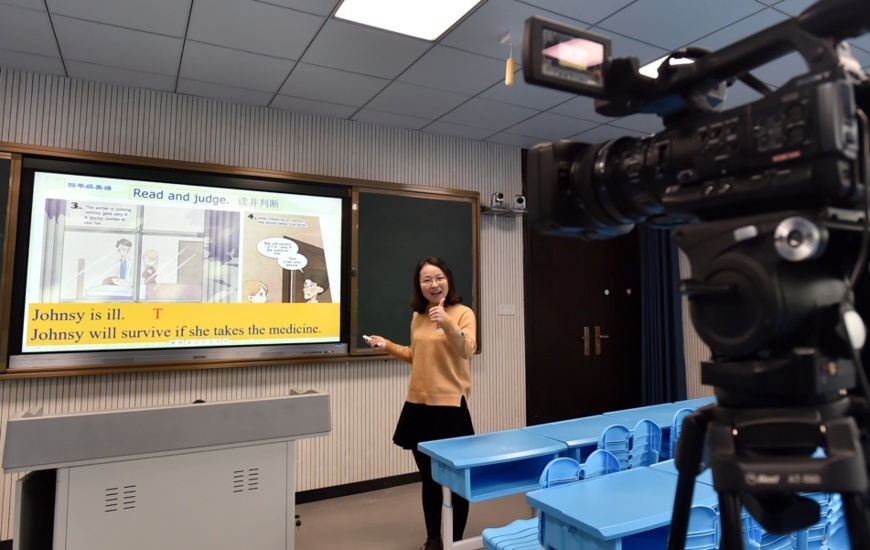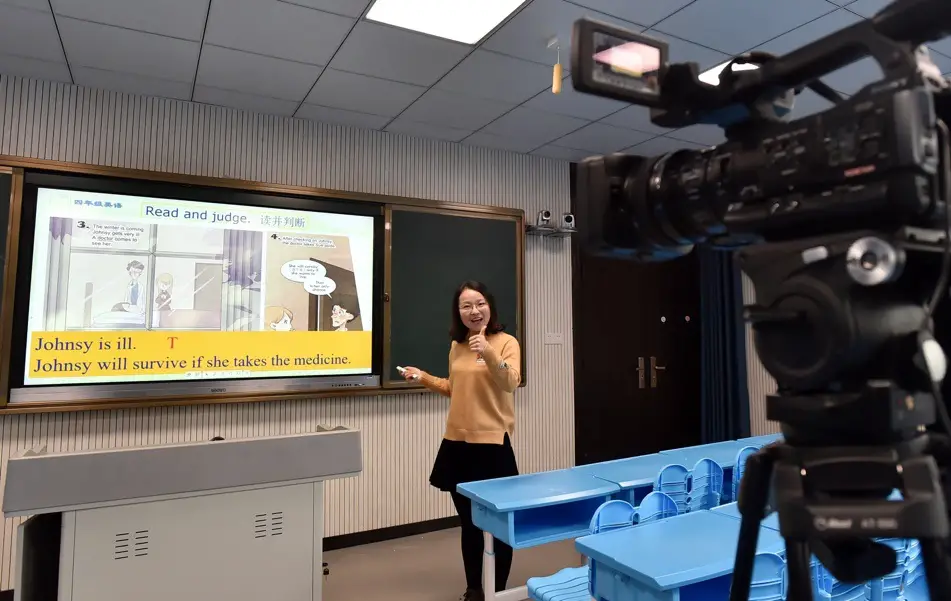By Xu Yuyao, People’s Daily

Teacher Zhu Aihua records an English class for fourth-grade primary students in the city of Yangzhou, East China’s Jiangsu Province on March 1. Photo by Zhuang Wenbin/People’s Daily Online
“Will online courses work?”
That was a question striking Sonam Lhamo, a physics teacher in Shigatse, China’s Tibetan Autonomous Region when she was first required to teach online two months ago due to the COVID-19 outbreak.
However, her worries were dispelled immediately after attending an online class given by Yao Xueqing, a physics teacher aiding Tibet’s education from Shanghai.
“The class was very interactive,” said Sonam Lhamo, who has taught students for 13 years.
In 2003, Sonam Lhamo, a native-born Tibetan, for the first time left her hometown and went to study computer science at a university in Central China’s Henan Province, where she was firstly introduced to the internet, a completely fresh world.
But the circumstances are different now for her students, as the internet is nothing new to them who sometimes have more knowledge about it than the teachers do.
Yao, who teaches at the Shanghai Experimental School in Shigatse, had once collaborated with Sonam Lhamo during online courses. Yao noted the changes brought to the students by the internet.
Last November, Yao livestreamed a class for middle school students in Shigatse. To make sure the students are well prepared, he distributed learning materials to them before the class. As a result, the students learnt very fast, and some of them proudly shared with him what they had learnt from the class.
“Education is more about teaching students how to study than just imparting knowledge to them. It will exert a far-reaching influence on them as it enables them to complete more complicated and diversified jobs,” Yao said.
The access to online resources has laid a solid foundation for informationized education in Tibet. According to the autonomous region’s education authority, as of the end of 2019, a total of 826 middle and primary schools, or 86.3 percent of the total in Tibet, had been connected to the internet. Nearly 30 percent of the them were equipped with a bandwidth of 100mbps.
What internet brings to education is not only interconnectivity, but also educational equality. To achieve this, a cloud education platform was launched by local education authority in Tibet.
The platform, with nearly 600,000 registered users, and more than 120,000 educational resources, offers learning materials of all curriculums, video courses, and tutorials in Tibetan language. Students and teachers can access the top-notch courses and teaching materials of the autonomous region and even the country at large for free.
“In Tibet, many remote areas are bothered by the scarcity of teachers and relevant resources. Online education can both ease the burden of teachers and help students better absorb the knowledge,” said Zhu Shenggao, an official with the autonomous region’s education department.
Internet-powered education will become meaningless if it can’t improve teaching quality, and without high-quality education, poverty will be passed on to future generations, Zhu added.
At present, the internet is being exploited by teachers in Tibet to improve their teaching. For instance, the five counties and districts in Shigatse receiving pairing assistance from Shanghai are now livestreaming classes, and video conferences are being held for teachers to discuss and improve their teaching skills.
“Tibet is a vast plateau where teachers face limited opportunities and high cost to communicate with and learn from their peers due to the inconvenient traffic condition. The internet is providing us with more such opportunities,” said a Tibetan teacher taking part in teleclass.
Over the past years, Tibet has made extraordinary achievements in reducing poverty through education. By the end of November 2019, the dropout rate of school-age children in the region had almost hit zero.
According to statistics, Tibet’s educational finance investment has totaled 67.22 billion yuan since 2016. As of January this year, 38.9 percent of the schools in Tibet had access to smart education, and “Internet Plus education” is expected to cover all middle and primary schools in the region before the end of this year.
All these efforts are profoundly changing the future of Tibetan students. The internet has brought the vast world closer to and magnified it for Tibetan students so that they have more courage and capability to embrace the future.
Online education is quietly changing the habits of teachers and students in impoverished and remote areas, as a bridge of the internet stretching over Tibet Autonomous Region, bringing infinite possibilities.
That was a question striking Sonam Lhamo, a physics teacher in Shigatse, China’s Tibetan Autonomous Region when she was first required to teach online two months ago due to the COVID-19 outbreak.
However, her worries were dispelled immediately after attending an online class given by Yao Xueqing, a physics teacher aiding Tibet’s education from Shanghai.
“The class was very interactive,” said Sonam Lhamo, who has taught students for 13 years.
In 2003, Sonam Lhamo, a native-born Tibetan, for the first time left her hometown and went to study computer science at a university in Central China’s Henan Province, where she was firstly introduced to the internet, a completely fresh world.
But the circumstances are different now for her students, as the internet is nothing new to them who sometimes have more knowledge about it than the teachers do.
Yao, who teaches at the Shanghai Experimental School in Shigatse, had once collaborated with Sonam Lhamo during online courses. Yao noted the changes brought to the students by the internet.
Last November, Yao livestreamed a class for middle school students in Shigatse. To make sure the students are well prepared, he distributed learning materials to them before the class. As a result, the students learnt very fast, and some of them proudly shared with him what they had learnt from the class.
“Education is more about teaching students how to study than just imparting knowledge to them. It will exert a far-reaching influence on them as it enables them to complete more complicated and diversified jobs,” Yao said.
The access to online resources has laid a solid foundation for informationized education in Tibet. According to the autonomous region’s education authority, as of the end of 2019, a total of 826 middle and primary schools, or 86.3 percent of the total in Tibet, had been connected to the internet. Nearly 30 percent of the them were equipped with a bandwidth of 100mbps.
What internet brings to education is not only interconnectivity, but also educational equality. To achieve this, a cloud education platform was launched by local education authority in Tibet.
The platform, with nearly 600,000 registered users, and more than 120,000 educational resources, offers learning materials of all curriculums, video courses, and tutorials in Tibetan language. Students and teachers can access the top-notch courses and teaching materials of the autonomous region and even the country at large for free.
“In Tibet, many remote areas are bothered by the scarcity of teachers and relevant resources. Online education can both ease the burden of teachers and help students better absorb the knowledge,” said Zhu Shenggao, an official with the autonomous region’s education department.
Internet-powered education will become meaningless if it can’t improve teaching quality, and without high-quality education, poverty will be passed on to future generations, Zhu added.
At present, the internet is being exploited by teachers in Tibet to improve their teaching. For instance, the five counties and districts in Shigatse receiving pairing assistance from Shanghai are now livestreaming classes, and video conferences are being held for teachers to discuss and improve their teaching skills.
“Tibet is a vast plateau where teachers face limited opportunities and high cost to communicate with and learn from their peers due to the inconvenient traffic condition. The internet is providing us with more such opportunities,” said a Tibetan teacher taking part in teleclass.
Over the past years, Tibet has made extraordinary achievements in reducing poverty through education. By the end of November 2019, the dropout rate of school-age children in the region had almost hit zero.
According to statistics, Tibet’s educational finance investment has totaled 67.22 billion yuan since 2016. As of January this year, 38.9 percent of the schools in Tibet had access to smart education, and “Internet Plus education” is expected to cover all middle and primary schools in the region before the end of this year.
All these efforts are profoundly changing the future of Tibetan students. The internet has brought the vast world closer to and magnified it for Tibetan students so that they have more courage and capability to embrace the future.
Online education is quietly changing the habits of teachers and students in impoverished and remote areas, as a bridge of the internet stretching over Tibet Autonomous Region, bringing infinite possibilities.
 Menu
Menu
 Internet gives a leg up to Tibet’s education
Internet gives a leg up to Tibet’s education
















